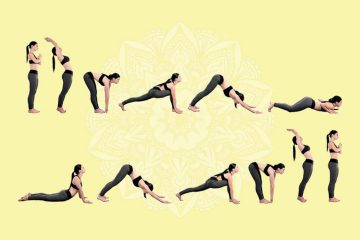In today’s fast-paced world, where stress and sedentary lifestyles have become the norm, finding a holistic approach to maintaining good health is crucial. Daily yoga practice has emerged as a popular and effective solution, offering a myriad of physical, mental, and emotional benefits. In this article, we will explore 15 compelling health benefits that arise from incorporating yoga into your daily routine.
1. Improved Flexibility
Daily yoga practice works wonders for flexibility, gradually transforming your body’s range of motion. As you move through various asanas, muscles are gently stretched and lengthened. This not only increases overall mobility but also enhances joint flexibility, reducing the likelihood of injuries. The consistent practice of yoga positions encourages the muscles to adapt and become more pliable over time, promoting a fluid and agile body.
2. Increased Strength
Contrary to common belief, yoga is an excellent strength-building exercise. The diverse array of poses engages different muscle groups, fostering both strength and endurance. As you progress in your practice, you’ll witness a noticeable improvement in muscle tone. The isometric contractions involved in holding poses contribute to building lean muscle mass, creating a foundation for a stronger and more resilient physique.
3. Better Posture
In our technology-driven era, poor posture is rampant, leading to various health issues. Yoga addresses this by promoting body awareness and alignment. Through mindful practice, individuals learn to maintain proper spine alignment, reducing the strain on the back and neck. Improved posture not only enhances physical appearance but also prevents and alleviates back pain associated with modern sedentary lifestyles.
4. Enhanced Respiratory Function
Yogic breathing exercises, or pranayama, are integral to yoga practice and significantly impact respiratory function. These exercises focus on controlled breathing, increasing lung capacity and efficiency. Improved respiratory function enhances oxygen intake, contributing to increased energy levels and overall cardiovascular health. The conscious regulation of breath in yoga fosters a deep connection between the body and mind, promoting a sense of calm and balance.
5. Stress Reduction and Relaxation
One of yoga’s most celebrated benefits is its ability to mitigate stress. The combination of mindful breathing, meditation, and physical movement activates the parasympathetic nervous system, inducing a relaxation response. This reduces the production of stress hormones, alleviating the mental and physical toll of stress. Incorporating yoga into daily life provides a practical and accessible tool for managing the challenges of a hectic lifestyle.

6. Improved Sleep Quality
For those struggling with sleep issues, yoga can be a natural remedy. The relaxation techniques embedded in yoga practice, coupled with the reduction in stress levels, contribute to improved sleep quality. Establishing a calming pre-bedtime routine that includes yoga can signal to the body that it’s time to unwind, fostering a deeper and more restful night’s sleep.
7. Enhanced Mental Clarity and Focus
Yoga’s emphasis on mindfulness and presence translates into tangible benefits for mental clarity and focus. The meditative aspects of the practice help quiet the mind, reducing mental chatter and enhancing cognitive function. Regular yoga practice cultivates a heightened sense of awareness, allowing individuals to approach tasks with increased focus and concentration.
8. Boosted Immune System
The holistic nature of yoga positively influences the immune system. The combination of physical movement, controlled breathing, and stress reduction contributes to a strengthened immune response. Regular practice enhances the production of immune cells, providing better protection against infections and illnesses. A robust immune system is fundamental to overall well-being and longevity.
9. Balanced Hormones
Yoga’s impact on hormonal balance is particularly beneficial for women. Certain poses stimulate the endocrine system, regulating the production of hormones. This can aid in the management of menstrual irregularities and alleviate symptoms associated with hormonal fluctuations. The gentle yet powerful influence of yoga on the endocrine system contributes to overall hormonal harmony.
10. Weight Management
While not an intense calorie-burning activity, yoga plays a role in weight management. The mindfulness cultivated during practice extends to eating habits, promoting a greater awareness of the body’s hunger and fullness cues. Additionally, the physical demands of certain yoga styles contribute to calorie expenditure, making it a supportive element in a holistic approach to weight maintenance.
11. Pain Relief
Yoga is increasingly recognized as a complementary therapy for managing chronic pain conditions. The gentle stretching, strengthening, and relaxation techniques incorporated in yoga can alleviate pain and improve overall function. Individuals dealing with conditions such as arthritis or lower back pain often find relief through the consistent practice of yoga, making it a valuable tool in pain management.
12. Improved Circulation
The varied poses and movements in yoga stimulate blood flow throughout the body. Enhanced circulation ensures that organs receive an optimal supply of oxygen and nutrients, promoting overall cardiovascular health. The gentle inversions and twists in yoga encourage venous return, reducing the risk of blood clots and enhancing the efficiency of the circulatory system.
13. Enhanced Digestive Health
Yoga’s positive impact on digestive health stems from poses that involve twisting and compression. These movements massage the internal organs, promoting better digestion and nutrient absorption. The relaxation response induced by yoga further alleviates digestive issues such as bloating and indigestion. Regular practice can contribute to a more balanced and harmonious digestive system.
14. Emotional Well-Being
Beyond the physical aspects, yoga addresses emotional well-being. The integration of mindfulness, breathwork, and meditation helps manage and alleviate symptoms of anxiety and depression. The practice of being present in the moment fosters emotional resilience, allowing individuals to navigate life’s challenges with a greater sense of calm and equanimity.
15. Community and Connection
Engaging in yoga classes creates a sense of community and connection. Building relationships with like-minded individuals provides a support system that extends beyond the physical practice. The shared journey of self-discovery and well-being fosters a positive and encouraging environment, contributing to overall mental and emotional health.
Incorporating daily yoga practice into your routine offers a holistic approach to health and well-being. From the tangible improvements in flexibility and strength to the profound impact on mental and emotional balance, yoga proves to be a versatile and accessible tool for cultivating a healthier and more fulfilling life. As you embark on this transformative journey, each benefit unfolds, unlocking vitality and paving the way for a harmonious and resilient existence.


